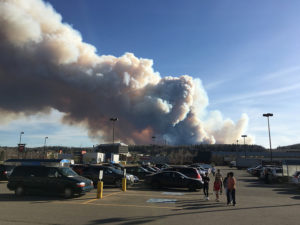|
Getting your Trinity Audio player ready...
|
This blog post recently appeared on Fusesocial.ca, the website of FuseSocial, Capacity Canada’s partner in Fort McMurray, Alberta. The community’s non-profit infrastructure, made up of many groups that provide services to residents, was among the casualties in the wildfire that swept through Fort McMurray in May. The recovery in the sector won’t be quick; but it will be informed and strategic, thanks to the work undertaken by FuseSocial.
Anybody who has ever suffered a serious injury knows you can’t rush the recovery. Getting back on your feet and en route to something even approaching normal often involves a team of family members, friends and colleagues, and health-care workers.
It’s a journey, rarely smooth and setback-free.
 But a recovery based on a well-informed strategy is bound to arrive at a better outcome than one resting on wobbly best guesses and ad hoc decision-making.
But a recovery based on a well-informed strategy is bound to arrive at a better outcome than one resting on wobbly best guesses and ad hoc decision-making.
It might seem odd to some that FuseSocial undertook a survey of Fort McMurray’s social-profit sector when there was — and still is — so much heavy lifting to do in the aftermath of the wildfire in May.
By stepping back and assessing the current situation, FuseSocial gains fact-based knowledge on immediate, near and long-term needs in the sector. The survey adds traction to a recovery that will be complicated and slow.
So what did we learn? Conducted by Propell:us and supported by the RBC Foundation, the survey drew more than 70 responses from 200 agencies. Most organizations — 94 per cent — reported being fully or partially operational.
Almost 90 per cent said their losses were partially or fully covered by insurance. Fifty-three per cent reported damage to buildings, equipment, or both.
Cash flow, not surprisingly, ranks as the most immediate need. The fire swept fundraising events off the calendar. Half the survey’s respondents reported a negative change in revenue.
The solution is not as simple as quickly setting up new events and selling tickets. The survey identified a problem that will probably take a long time to fix — the reduction of human resources.
Seventy-five per cent of respondents reported experiencing a small to significant negative impact to their operations as a result of staff and volunteers who have yet to return to work, or who have opted not to come back to the community.
That illuminates a recruitment and training challenge ahead. Meanwhile, the demand for service from a battered community falls on fewer shoulders.
Nevertheless, 58 per cent of respondents expect to increase service, not just restore them to pre-fire levels. In spite of losing property, in spite of the tightening of revenue and human resources, in spite of setbacks caused by the loss of files and equipment, Fort McMurray’s social-profit sector is determined to pick up and move forward.
The survey found more hope than hopelessness, more strength than weakness. Respondents used such words as optimism, confidence and dedication.
FuseSocial now knows more about the damage done to the sector, and where the priorities lie in the recovery. And there is no question about the community spirit to see it through.
Photo credit: Fort McMurray Fires, Sunday May 1, 2016, by jasonwoodhead23, licensed under CC by 2.0.

